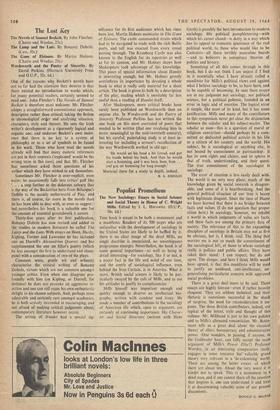The Lost Key
ONE of the reasons why Beckett's novels have not so far had the attention they deserve is that there existed no introduction to works which, for many potential readers, certainly seemed to need one: John Fletcher's The Novels of Samuel Beckett is therefore most welcome. Mr. Fletcher adopts a straightforward conventional approach, descriptive rather than critical, taking the fiction in chronological order and analysing situation, characters, style and themes. He sees the Irish writer's development as a rigorously logical and organic one, and endorses Beckett's own insist- ence that there is no key to a system of philosophy or to a set of symbols to be found in his work. Those who have read the novels already will find that many esoteric references are put in their contexts ('explained' would be the wrong term in this case), and that Mr. Fletcher has sometimes asked those questions of his author which they have wished to ask themselves.
Sometimes Mr. Fletcher is over-explicit, even naïve; he occasionally falls into critics' guff like `. . . a step further in the dolorous calvary that is the way of the Beckettian hero from Belacqua's Dublin to the muddy netherworld of Pim,' and there is, of course, far more in the novels than he has been able to deal with, or even to suggest : but nevertheless his book is a valuable one for the amount of essential groundwork it covers.
Thirty-five years after its first publication, Bonamy Dobrde has now revised and added to the studies in modern literature he called The Lamp and the Lute. With essays on Ibsen, Hardy, Kipling, Forster and Lawrence he has included one on Durrell's Alexandrian Quartet, and has supplemented the one on Eliot's poetry (which he was amongst the first to understand and cham- pion) with a consideration of two of the plays.
Common sense, gentle wit and urbanity characterise the critical writing of Bonamy Dobrde, virtues which are not common amongst younger critics. Even when one disagrees pro- foundly with him (on Kipling, or Durrell, for instance) he does not provoke an aggressive re- action and one can still enjoy his own enthusiastic delight in his chosen subjects. And, perhaps most admirable and certainly rare amongst academics, he is both actively interested in encouraging, and not afraid of making critical judgments about, contemporary literature however recent.
The setting of Hamlet had a special sig-
nificance for its first audiences which has since been lost, Martin Holmes maintains in The Guns of Elsinore. The castle commanded straits which had to be navigated to trade with the rich Baltic ports, and toll was exacted from every vessel passing through. The Kronborg Castle was also known to the English for its tapestries as well as for its cannon, and Mr. Holmes shows how Shakespeare took advantage of this knowledge. This piece of special information about Hamlet is interesting enough, but Mr. Holmes grossly overinflates its importance by devoting a whole book to what is really only material for a short article. The book is given its bulk by a description of the play, reading which is inevitably far less useful than a reading of Hamlet itself.
After Shakespeare, more critical books have surely been published on Wordsworth than on anyone else. In Wordsworth and the Poetry of Sincerity Professor Perkins has not written the one book on this most overrated of poets that needed to be written (that one revaluing him in terms meaningful to the mid-twentieth century), but his careful, painstaking study is at least in- teresting for including a servant's recollection of the way Wordsworth worked in old age: 'He would set his head a bit forrad, and put his hands behint his back. And then he would start a bumming, and it was bum, bum, bum ... and goa on bumming for long enough.' Material there for a study in depth, indeed. B. S. JOHNSON


































 Previous page
Previous page